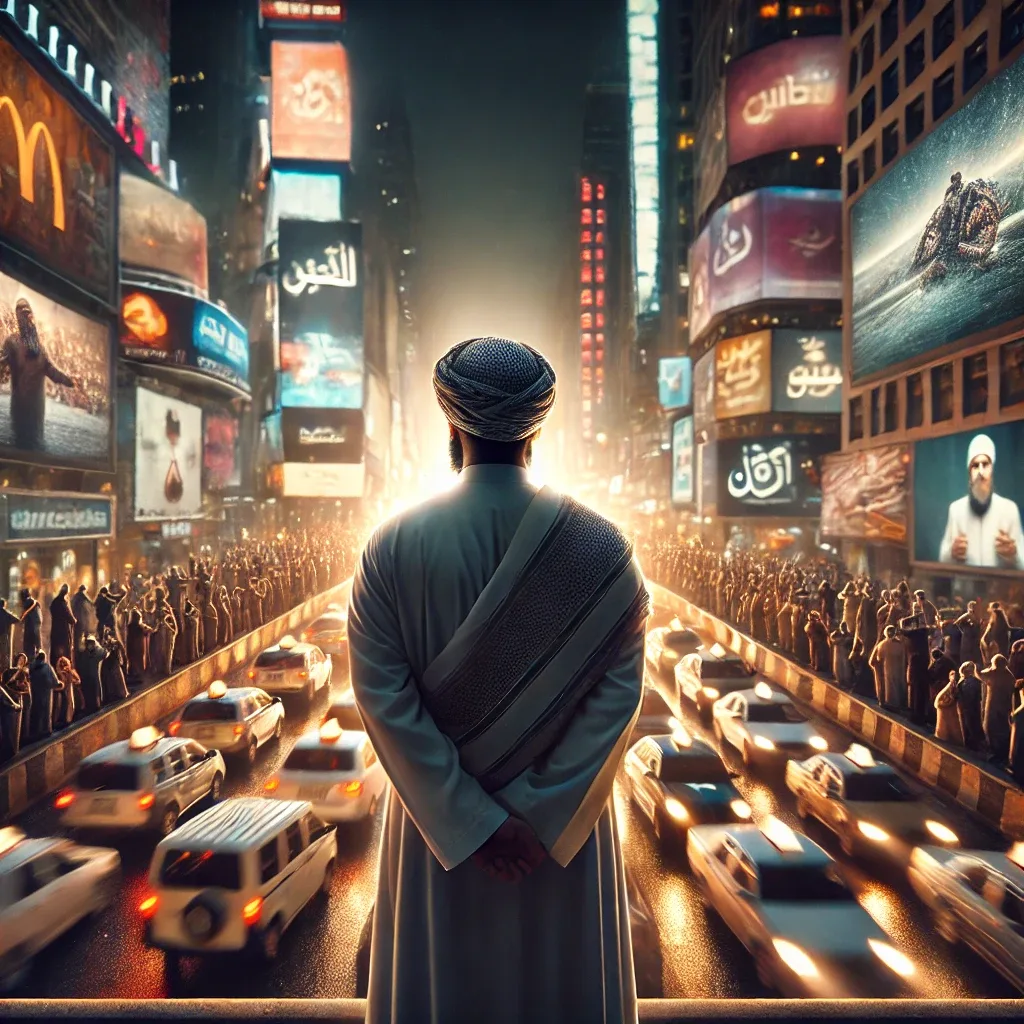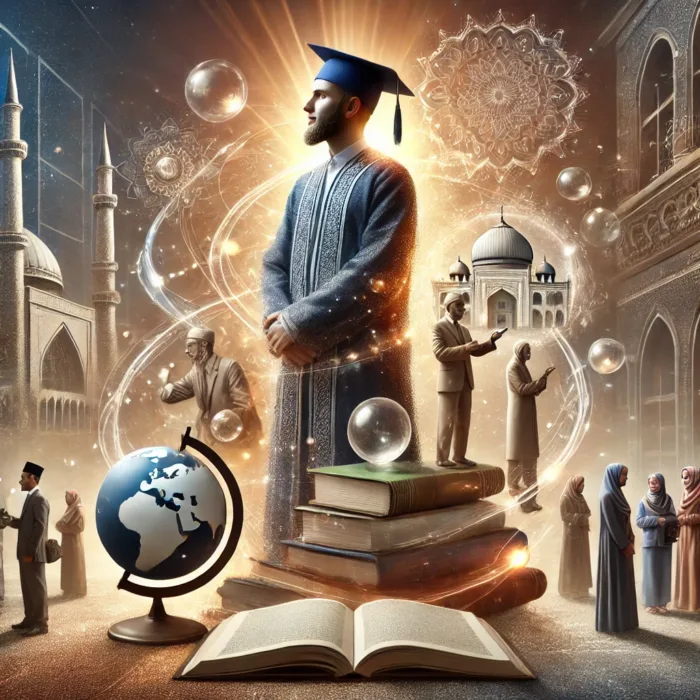Table of Contents
Introduction
This is the fifth article in the ‘Be Proud of Your Islam‘ series. It emphasizes the importance of Muslims acknowledging their responsibility to humanity and their role in guiding others. Recognizing this responsibility has a positive impact on their behavior, ethics, and contributions in both scientific and practical fields. The article also highlights personal experiences related to these areas. Click here to explore the full series.
Embracing Muslim Responsibility: Elevating Purpose and Dignity
What do I gain when I realize the world’s need for me as a Muslim? And when I understand what has been lost due to the decline of Muslims? How does it affect my psychology, life, and behavior when I recognize that Muslims are the last refuge?
These are the questions we’ll explore in today’s article, which includes personal stories as well as insights from friends. This topic is not just relevant to those who engage in dawah or interact with non-Muslims; it is essential for all of us.
The sense of Muslim responsibility towards humanity is not an easy burden, yet it is also a profound blessing. Personally, I have found immense benefit in this awareness. Recognizing that nations more advanced than us are not our masters, but instead have their own needs, raises your concerns and gives your life true meaning. It allows you to view yourself with dignity.
This sense of responsibility drives you to excel in both natural and specialized sciences, and you begin to see these pursuits as great blessings from ALLAH. It also helps protect you from being swayed by the forbidden desires promoted by non-Muslim cultures.
Mercy and Guidance: The Muslim Duty to Humanity
The sense of responsibility that Muslims have defines their relationship with non-Muslim peoples. With this awareness, you won’t feel inferior or inadequate to them, nor will you approach them with arrogance. Instead, you become a role model for them. Understanding that they need you, you show them mercy, helping them resist their inner struggles and the misleading influences of those who lead them astray.
This is the foundation of the Muslim relationship with others: mercy. The Prophet of Mercy (Peace be upon Him) taught us this when he said:
“The Compassionate One has mercy on those who are merciful. If you show mercy to those who are on the earth, HE Who is in the heaven will show mercy to you“1
Notice that the phrase “If you show mercy to those who are on the earth“ is broad in its meaning, and the highest form of mercy is guiding others, leading them from darkness into light. ALLAH has made this act of mercy a reason for HIM to show us mercy as well: “HE Who is in the heaven will show mercy to you“.

Even the guidance ALLAH has given regarding conflicts with some people is not aimed at their destruction or to oppress them, but rather to weaken those who obstruct HIS path and to improve the conditions of nations. The strength shown against those who prevent others from following ALLAH’s path is, in fact, a form of mercy towards these peoples. Never forget that you are part of a nation raised for the benefit of mankind, as if ALLAH has entrusted us with a responsibility for people’s well-being.
Carrying the Light: The Muslim Call to Guide and Uplift Humanity
The sense of responsibility that Muslims feel towards humanity elevates their concerns and gives their life deep meaning. It makes you view yourself with dignity and say,
“If you seek noble honor, do not
settle for anything less than the stars“,
and,
“When souls are great, bodies
tire in pursuit of their goals“
You work hard to rise to the level of being part of the nation of those whom ALLAH described as:
“And WE have not sent you, [O Muḥammad], except as a mercy to the worlds“2
(Suraat ‘Al-‘Anbiyaa’, 21:107)
You see yourself as having a share in this noble verse. As you begin to notice humanity’s suffering, you tell yourself: “I am responsible. I must guide these people with the light I carry“, rather than waking up each day uncertain of what to do. Remember, every second, forty people take their own lives, and the cure for them and others lies in your hands.
Guidance is a torch that we must carry and spread. If we do not fulfill its trust, we risk burning ourselves. Look at how the LORD of the worlds addresses humanity:
“O mankind, there has come to you a conclusive proof from your LORD, and WE have sent down to you a clear light“3
(Suraat ‘An-Nissaa’, 4:174)
He also says to the People of the Book:
“…There has come to you from ALLAH a light and a clear Book [i.e., the Qur’ān]. By which ALLAH guides those who pursue HIS pleasure to the ways of peace and brings them out from darknesses into the light, by HIS permission, and guides them to a straight path“4
(Suraat ‘Al-Maa’idah, 5:15-16)
The LORD of the worlds sent down this light, and HE has entrusted it to the people, why? Because there is a Muhammadan nation entrusted with carrying and spreading it.

How many of us Muslims travel to China or other places, east and west, for trade, without ever thinking to invite these people to Islam? How many of us go sightseeing, enjoying nature and relaxation, without considering bringing dawah materials in the local language or thinking about earning reward by treating people in a way that endears Islam to them?
Sharing the Light: Real-World Stories of Islamic Dawah
Two of my friends had business visits to China and made an effort to introduce the topic of Islam whenever possible. One day, they entered a grocery store, and the store owner asked them, “Are you Muslims?” When they said, “Yes”, he replied, “I love Muslims”. They then asked him, “Why don’t you become Muslim?” They spent about fifteen minutes explaining Islam to him, and he accepted it. Afterward, they asked, “Why do you love Muslims?” He replied, “I have a Muslim neighbor who owns a restaurant. Every time he passes by me, he smiles and greets me. Over time, I came to love Muslims and wanted to be like my neighbor“.
Another time, my friends met an electronics parts merchant. They recited some verses from the Quran to him, and although he didn’t understand the meaning, his heart was deeply moved. They explained Islam to him, and he accepted it. He prayed with them and continued to maintain a relationship with them. This brother later named himself Omar.
These two brothers may not be scholars in the traditional sense, but they carry the true concern for Islam. How many of us have non-Muslim neighbors or colleagues that we’ve never invited to Islam? By ALLAH’s grace, a Christian man in my country accepted Islam in my house after a conversation. His faith grew stronger, and he later married a Muslim woman.
Planting Seeds of Faith: Personal Experiences in Dawah and Invitation
By ALLAH’s grace, my first dawah experience took place when I was in first or second grade. I still remember the features of a Christian classmate. One day, I asked him, “Why don’t you become Muslim?” He replied, “I’ll ask my mom”, but she didn’t permit it. I share this personal experience to inspire and remind us that these concepts are not just theoretical, but practical—though I acknowledge, by ALLAH, that I fall short in many ways and seek HIS forgiveness. I encourage my brothers and sisters to share their own experiences in inviting non-Muslims to Islam in the comments, to help raise our aspirations.
During my travels abroad, I would often initiate religious discussions with those sitting next to me on planes. I recall one lengthy discussion I had with an Indian man, where I used concepts from Surah Al-An’am to explain Islam. Later, when I pursued my doctorate in America, it was ALLAH’s blessing that HE surrounded me with brothers who shared a love for dawah.
I remember one of my Egyptian brothers in Houston sharing the story of how Yusuf Estes accepted Islam. When we heard it, we immediately decided to invite him to visit Houston and organize activities for him to engage in dawah. This plan came to fruition, and I invited some of my colleagues and professors whom I thought might be receptive. Among them was a Jewish lab technician named Jacqueline Friedman. I will never forget how an American medical or nursing student accepted Islam after one of his lectures. The joy of that moment was unforgettable—her tears, the warm welcome from the Muslims, and the Muslim women embracing her with open arms.
Fulfilling the Duty: Personal Reflections on Dawah and Engagement
Among those who taught me were professors who treated me kindly and supported me. After my doctoral thesis was accepted with only minor revisions, and when all academic obligations between us were finished, I invited some of them to lunch, each separately. I would start with casual conversation, listen to them, and then say, “You, doctor, have been good to me during my studies, and I thank you and wish well for you, so I would like to talk to you about Islam“.

One of them would respond, “I respect your religion and have no problem with Muslims”, especially since this was after September 11th. I would then explain, “But I want to tell you about Islam for your own sake, for your own benefit“. Although some would apologize and say they weren’t thinking about religion at that time—which, unfortunately, some would say—I still made the effort to fulfill part of what I owed them.
Some might ask, “You speak of faith and polytheism while you lived among polytheists according to these definitions?” And I would reply: Yes, and I didn’t compromise with them about their religions; instead, I invited them to my religion. If I could go back, I wouldn’t change anything except to be more active in inviting them—and I seek ALLAH’s forgiveness for my shortcomings in this regard. I realize I wasn’t following up on the discussions as I should have, especially since I was more focused on inviting Muslims through sermons and lessons. At the same time, I was busy with my studies in pharmacology, scientific research, and the Islamic studies I began in America.
In Jordan, I had started some preliminary studies and readings in tafsir (Quranic interpretation), but it was in America where I became more active in Islamic studies. There, I worked with my Muslim brothers to organize “Islamic Awareness Week” activities, fulfilling part of my duty towards non-Muslims.
Realizing the Call: Inspiring Stories of Dawah and Human Connection
I knew brothers in America who truly carried the concern of inviting others to Islam, including an African American brother named Ismail. Ismail wasn’t a scholar of religious knowledge, but he had a kindness and a smile that reached deep into people’s hearts. As we often say, he “spoke from his heart”—his words and demeanor made you love him, whether you wanted to or not. Many people accepted Islam through him because of this genuine approach.
I also knew Brother Ibrahim, who would find any excuse to talk to people about Islam. Once, if he stood in line behind someone wearing a t-shirt that said “I love Jesus”, he would tap the person on the shoulder and say, “I love this t-shirt because it says ‘I love Jesus’, and I love Jesus too. Do you know why? Because I’m Muslim, and Islam teaches this and this about Jesus“.
Ibrahim worked at a detailing shop owned by a Muslim. One day, I met the shop owner, who shared a story with me: A customer came in once and sat with Ibrahim while waiting for his car to be detailed. Not long after, Ibrahim came out exclaiming “ALLAHu Akbar”, announcing that the brother had just pronounced the Shahada (testimony of faith).
I also know friends who would visit prisons on Saturdays to invite inmates to Islam, a form of prison dawah, coordinated with the prison administration. Many people accepted Islam through them, and I saw these brothers as exemplary role models in carrying the concern of dawah—models I greatly admire and learn from.
Even after returning to my country, I continue to interact with non-Muslim students. I know there are Christians among them, as well as others who follow series like “Good Thoughts About ALLAH” and “Journey of Certainty“, and benefit from them. This brings me great joy, and I ask ALLAH for their guidance.
Driven by our sense of Muslim responsibility toward humanity, several brothers, sisters, and I launched a project to translate episodes of “Journey of Certainty” and the “Women’s Series” into various world languages. We hope, by ALLAH’s grace, that this will be a means for whoever He wills to find guidance and enter Islam.
Representing Islam: The Role of Muslims in Excelling and Leading by Example
The sense of Muslim responsibility towards humanity motivates you to excel in your studies and work, contributing culturally until you become an ambassador who represents your religion with pride. It’s important to note—contrary to what some may say—that we are not required to delay our mission of saving humanity and inviting them to Islam until we have achieved economic or industrial advancement or reclaimed our lands. No matter how advanced nations become in science and technology, they cannot offer what will save humanity in this world or the Hereafter as long as they remain disconnected from the preserved revelation. As a Muslim, you have access to this great treasure.

When Muslims spread guidance and opened lands, liberating people from the enslavement of one another, they weren’t industrially or architecturally superior to other nations. What they had, however, was the light of revelation in their hearts, which gave meaning and purpose to their advancements in science. This made their progress beneficial for humanity, rather than being a calamity, as we often see today in the absence of spiritual guidance.
That said, this doesn’t mean that Muslims should accept a state of backwardness in the natural sciences. Personally, during my studies in America, I was determined to excel in my academic and research pursuits because I saw myself as an ambassador of my religion to the non-Muslims around me. By ALLAH’s grace, I outperformed my colleagues—who came from various nationalities and religions—in my academic work. I didn’t want to be someone who failed in knowledge and work and then tried to justify my shortcomings by convincing myself and others that I had something to offer them simply because of my faith.
I wasn’t ashamed of my Islamic identity or felt insignificant before them, as unfortunately, some people may feel. On the contrary, my eagerness to represent Islam well served as a powerful motivation for success and for doing good work.
Striving for Excellence: Integrating Faith and Knowledge in Service to Humanity
I remember the day of my doctoral dissertation defense at the University of Houston—it was a Friday morning. I presented my dissertation in a unique way, as the examining committee later testified, by ALLAH’s grace. At the conclusion, during the acknowledgments, I made sure to thank ALLAH—I didn’t say ‘God’—for helping me and facilitating my affairs after facing setbacks in my research. Then, I thanked my professors and colleagues who had supported me.
Afterward, I gave a sermon at Elfarouq Mosque in Houston on the dignity of Muslims. I still remember how the Muslims approached me after the sermon, embracing me and saying, “You made us hear something we’ve wanted to hear for a long time, something deep within our souls that you stirred”. After the sermon, I met one of my doctoral supervisors, Dr. Richard Point, for lunch, during which I spoke to him about Islam. Throughout all of this, I was striving to be an ambassador for Islam, ensuring that I represented it well.
By ALLAH’s grace, to this day, I engage with Western scientific knowledge—benefiting from it while also critiquing it. For example, I corrected an error in a research protocol being used in Dr. Richard Clark’s laboratory, and he thanked me for it. I also corrected mistakes in some of the most widely circulated pharmacology textbooks, and as a result, he listed my name as one of the reviewers. I’ve contributed to science through research published in international journals, and researchers in Switzerland even requested a model I used in one of my papers, which I sent to them.
Western journals also ask me to review research papers submitted to them, and I accept when I can. Additionally, I worked with my brothers and sisters on an animation project and created illustrative images for pharmaceutical and biological concepts, which we share globally with anyone interested. I view all of this as worship that draws me closer to ALLAH. Through it, I hope to contribute to people’s acceptance of Islam and to demonstrate that Islam is the religion of success.
Staying True to the Mission: Upholding Integrity and Responsibility in Dawah
The sense of Muslim responsibility prevents you from falling into trials and helps you maintain good character, especially when you see yourself as an ambassador for Islam. We live in environments filled with trials and desires, yet we cannot allow ourselves to be influenced by them or indulge in them. To do so would be a betrayal of ALLAH, HIS Messenger, and the trust HE has placed upon us. Instead, we remind ourselves that those around us are the very targets of our invitation, and it is our role to influence them positively, not to be influenced by their behavior.
If someone approaches me in a suspicious way, I close the door and send them an invitation to Islam via email, then avoid further engagement. When you have a goal this significant—saving humanity—you feel ashamed to stand still, complaining about a lack of patience in prayer or the struggle to avoid corrupting influences like inappropriate films.
O daughter, adjust your hijab! O brother, lower your gaze! And then what? What about the rest of us? Great tasks await us, so when will we rise to the occasion and address what truly matters? As the saying goes:
“You were created for a purpose, if only you
understood it… Raise yourself above the herd“
It’s also important to note that, even if you continue to sin, this should not stop you from inviting others to Islam. Don’t add to your sins the burden of neglecting your duty in saving humanity. Instead, bring ALLAH’s mercy upon yourself by actively calling others to HIM.

How many children of Muslims travel abroad, and their morals become corrupted, making them the worst ambassadors for Islam! I’ve even heard of non-Muslim landlords refusing to rent to Arabs, as some brothers have shared with me from those countries—unfortunately, this is the reality.
How many Muslims have permitted themselves to deceive others, particularly non-Muslims they interact with, preventing them from the path of ALLAH rather than guiding them to it? Why do we discuss our duty toward humanity? So that people like these realize how much they betray ALLAH, HIS Messenger, and the trust they’ve been given to save humanity.
The Blessing of Responsibility: Shaping Purpose and Integrity in Dawah
Your sense of responsibility makes you accountable for every action you take because you remember your LORD’s warning:
“And do not take your oaths as [means of] deceit between you, lest a foot slip after it was [once] firm, and you would taste evil [in this world] for what [people] you diverted from the way of ALLAH, and you would have [in the Hereafter] a great punishment“5
(Suraat ‘An-NaHl, 16:94)
As Ibn Kathir explains:
“When the disbeliever sees that the believer made a covenant with him and then betrayed him, he will no longer trust the religion, and this betrayal will prevent him from entering Islam. That is why ALLAH says, ‘...and you would taste evil [in this world] for what [people] you diverted from the way of ALLAH, and you would have [in the Hereafter] a great punishment‘”
This is the blessing of feeling responsibility: it shapes the way you relate to people of other faiths, reminding you that they are not your masters but are, in fact, in need of what you have to offer. This sense of responsibility elevates your concerns, gives your life profound meaning, and encourages you to strive in both knowledge and work to better represent your religion. It also makes you ashamed of being influenced by forbidden desires.
Reflect on the blessing of having a sense of responsibility. When ALLAH entrusted us with the task of inviting nations, it was ultimately for our own benefit. Consider ALLAH’s words:
“Whoever is guided is only guided for [the benefit of] his soul. And whoever errs only errs against it. And no bearer of burdens will bear the burden of another. And never would WE punish until WE sent a messenger“6
(Suraat ‘Al-‘Israa’, 17:15)
So, work with sincerity, and don’t let the current state of your nation or the wrongdoing of some dishearten you—“and no bearer of burdens will bear the burden of another“.
You may ask: “Where does all this talk of responsibility fit in with the texts about Jihad, harshness, and sternness toward disbelievers? Shouldn’t we feel ashamed when we approach non-Muslims with these ideas?”
I will address this in the next article, Insha’ALLAH.
Source:
- Dr. Eyad Qunaibi. لا تَدَع الخلق بل ادعهُم للخالق – كن عزيزاً بإسلامك [5]. YouTube Video.

